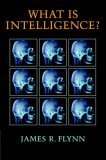
This is the first non-fiction book that I've (mostly) read in a while. A lot of my reading is online these days, but it's good to mix it up. I say "mostly" because I skimmed the last third (or so) of the book. Unfortunately, this looked like the more interesting information, but I just couldn't gut it out for another month after spending 2 months on it already.
The book posits a new theory of intelligence. Fundamentally, it's a discussion about the old nature vs. nurture arguments. Flynn puts forth that base intelligence is genetic, but that environment introduces a social multiplier such that intelligence can be increased beyond the base genetic capabilities.
He also talks extensively about how intelligence tests quickly fall out of norm, and thus either require to add a time calculation to compensate, or be re-baselined on a regular basis. In my mind, this is akin to the difference between "real" and "nominal" values in economics. The nominal score would be the actual score in a given year. The real score would be normalized to the year of the last baseline. As part of his model, Flynn includes a method for calculating these offsets.
Overall, I found this book to be quite interesting, though definitely a dry read - especially for someone with at most a hobbyist's background in cognitive psychology. Nonetheless, I would recommend it as what appear to be a very worthy attempt to unify previous theories. Also, for academia, he provides several tests that can be exercised to validate his theories (Flynn says he does theory, not experimentation).
